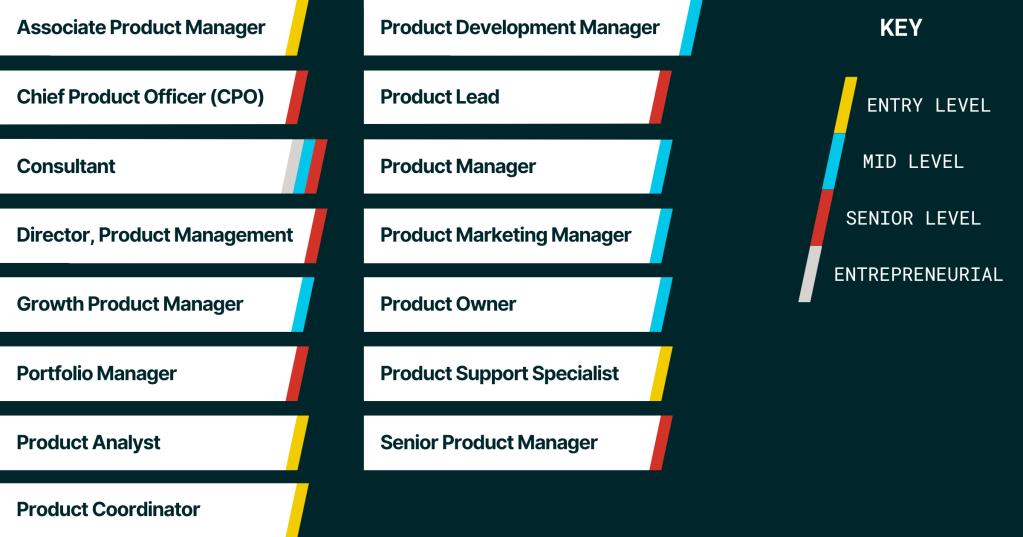Product management (sometimes abbreviated as PM or PdM) is a thriving and exciting career path that commands the use of a variety of skills. Cross-functional collaboration and leadership, combined with stellar interpersonal skills and the ability to integrate technical expertise, are among the most coveted skills for a product management professional. Learning and strengthening your skills in this field will prepare you to communicate effectively across an organization, lead successful product team efforts, and develop effective customer-centric products.
Not convinced yet? Here are a few data points to give you an idea of what the industry offers and where it’s heading.

Let’s review this skill set together by discussing how product management expertise can be acquired, applied, and transformed into a fulfilling career.
What can I do with my product management skills?
Professionals in the product management space wear many hats and work closely with marketing, sales, customer support, design, and engineering teams. Product managers play a vital role in aligning product design and technology with business strategy while ensuring customer satisfaction and product integrity. They’re always looking for innovative ways to enhance products and grow with stakeholders.
Because product management professionals hail from varied backgrounds with diverse skill sets, it is difficult to pin down a prototypical description. However, all product management professionals share a core function: drive the development of products and ultimately be responsible for the success of those products.
To know where your skill set fits within the industry, sometimes all it takes is a little research. Listen as Greg Livingston, a senior curriculum engineer for product management programs at edX, shares a little about their day-to-day experiences within the industry:

The day to day life of a product manager is always varied but always exciting as you spend your time trying to better understand your target customers, the problems they face and the ways your team can deliver value to them. It takes research, strategic thinking, great communication and leadership to take all the information around you and pull it into a vision that your team of developers and designers can bring to life by developing the right set of skills and learning the right frameworks to organize your work. You can be a highly effective product leader and build something great with your team.
Discover your career opportunities
Acquiring product management skills opens up a wide range of career opportunities around the world.

Product management job titles are generally straightforward; though, some may have system- or industry-specific titles. In addition, you may find the titles “product manager” and “product owner” used in a similar fashion. Some mid-level job titles may focus on a subcategory such as product growth, development, or marketing.
How can I acquire product management skills and turn them into a career?
If you are interested in exploring ways to turn your product management skills into a rewarding career, we recommend taking the following steps:
Research is key in any career, and a career in product management is certainly no exception. Take advantage of all the information available to you, whether it’s through an internet search for job titles, listening to industry-specific podcasts, or getting connected to professionals in the areas or positions that interest you.
Pro tip:
Explore your career’s possibilities. As part of your research, take every opportunity to learn more about topics in your desired field. Browse the edX course catalog at edx.org to see what product management -related topics, courses, and programs interest you, and start advancing your career in product management today.
One key part of the research phase is networking. This simple step is often overlooked and undervalued but can significantly impact your career trajectory. To gain clarity on your career goals and aspirations, take time to speak with professionals about their day-to-day work. The information gained from networking conversations will help you decide if product management career opportunities fit your interests, wants, and needs.
As you make networking connections, remember the key to effective networking is building long-lasting relationships. Continue to nurture your professional relationships. When you are ready to begin applying for career opportunities, you will already have a network of relevant professionals to ask for advice or referrals.
Pro tip:
We highly recommend scheduling informational interviews to learn and connect with product management professionals and hiring managers to gather information. These people can help you learn new skills, offer advice, and share job opportunities.
Check out our Networking Guide, Behavioral Interview Prep Guide, and Outreach Templates and Resources for help getting started.
To supplement your understanding of what others are doing professionally, make sure you have a clear vision of your own goals and aspirations. The field of product management is versatile, and there are many avenues you can travel on the way to your ideal career. Be sure to check in with yourself as you speak with professionals in the field because the possibilities are endless.
Product management requires a combination of specific business, technical, and people skills to effectively shepherd a product through the various phases of its lifecycle.
The most essential skills for a product management professional are:
Product development processes — A concrete understanding of the role and product development processes and frameworks is essential. Before getting into the interpersonal dynamics of working with a product development team, product management professionals must speak their language, comprehend the expectations, and know the scope of their job versus that of project managers, UX professionals, architects, and others.
Pricing principles — Product management professionals also need a solid understanding of fundamental business and economic policies because pricing is often their responsibility as well. They must be able to develop products that are profitable and scalable.
Prioritization — Prioritization is at the core of product management. Assessing the relative value and impact of each potential feature, technical debt, project, and initiative and creating a coherent strategy is the most critical part of the job. A coherent strategy includes being able to say no when the time comes, and recognizing the need for a pivot or strategic shift if applicable.
Communication — Communication is very important to the success of all product management professionals. They must be comfortable speaking with all sorts of people filling different roles. They must be able to speak with and relate to customers, internal teams, engineers, and stakeholders. Conveying a strategy and vision, along with specific plans and their rationale, is vital. Product management professionals must build consensus, break down and work across organizational silos, and win over stakeholders to get their job done.
Underpinning these essential skills are collaboration, persuasion, and exceptional organization and time management skills. With a strong foundation and the essential skills listed above, you will be able to explore a multitude of options in the field of product management.
Pro tip:
Another way to identify which skills match your career aspirations is to look at job postings that interest you. Take note of the skills and technologies that are listed in the descriptions. These are the skills that will qualify you for these roles in the future.
Continuing education plays a crucial role in long-term career success for product management professionals. It is important that you find ways to keep learning and growing in an ever-evolving product environment. The good news is that you don’t have to look very far to uncover an enriching learning opportunity. Here are a few options to consider:
Self-education — If you want to learn asynchronously, informally, or casually, self-education is a great place to start. Many approaches to this learning style support career goals, budgets, learning styles, and time commitments. Here are some to consider:
- Informal opportunities: Gain a greater understanding of the industry by reading. Explore books, articles, and even research papers to expand your product management knowledge and learn what’s happened or is happening in the field. Not a reader? Plenty of videos, podcasts, and other forms of multimedia can help you learn about product management careers.
Online Courses — If you prefer a more structured or socialized learning experience, online courses might be well-suited. edX.org offers several instructor-led and self-paced product management courses that may be of interest.
Professional certifications — When you want a less casual learning experience but don’t have needs that warrant a boot camp or degree, professional certifications may be the best fit for you. Professional certifications are a great addition to your resume and prove your skills. edX.org offers many certificate programs in the field of product management that may interest you.
Boot camps — Experienced curriculum teams design these innovative programs to help you achieve your career goals in a fraction of the time it takes to complete a traditional degree. With many boot camps lasting just 3–12 months, you’ll be amazed at how quickly you can gain the knowledge and expertise you need to launch your dream career. Explore popular product management boot camps on edX.org.
Product management degree — Pursuing a degree in product management is an excellent choice if you want to gain a comprehensive understanding of the rich history, intricate theories, concepts, and cutting-edge innovations that have contributed to shaping the world of product management.
Employers in the product management space may require a portfolio of projects, such as course projects, personal projects, and professional projects. Developing an online portfolio that highlights your skills and unique value will not only help you compete for opportunities, it will help you learn by doing and will showcase your best product work.
Helpful resources:
The career team at edX has resources and workshops to help you fine-tune your application materials and prepare for interviews. Start with the Behavioral Interview Prep Guide to help you prepare for interviews.
Expert advice
“[When developing your career materials], show your value as a well-rounded professional, think about how you bridge the gap between your technical/field-related knowledge and your transferable skills. What is your value-added as a professional in your field? What makes you different? Add projects to show additional credibility in your field, especially related to technical skills. If you don’t have experience in the field, this is a great way to show tangible evidence of your knowledge.”
– Deanna Parkton, career expert at edX

Once you secure your first position in the industry, be sure to celebrate your success. The career journey is full of ups and downs, and we believe every victory deserves acknowledgment.
With that said, your journey doesn’t end here — it’s only just beginning. Give yourself grace and understand that careers are not linear. Here are some of the ways that you could continue growing within the product management industry:
Continued learning — Always reference our course catalog on edX.org for continued learning opportunities. Now that you’ve taken the first step in your career, it never hurts to brush up on your skills, expand your knowledge within the industry, or learn about other subjects that could apply to your work, interests, or something in between.
Promotions — Career advancement in product management can vary across industries and organizations. Depending on your industry, role, function, and product type, you may advance to a senior product manager or start your own product consulting business.
Pivots — Make sure to regularly check in with yourself and your satisfaction with daily tasks. If you are not satisfied in your current role, take stock of what you like and dislike about it, keep your eyes out for company-sponsored growth opportunities, and pursue career pivots that optimize your background, skill set, and interests.
What could my career look like with a product management skill set?
It is difficult to say exactly what your life would look like as a product management professional, but we have some metrics about the realities of the field. Consider how the following insights from The Future of Product Management Report (2023) may factor into your career journey:
The best product wins — Product-led growth is becoming a critical strategic approach for most companies as they scramble to retain customers and expand the customer experience.
Companies are eager to keep their talent — LinkedIn’s 2023 Workplace Learning Report cited that 93% of companies are concerned about talent retention. To retain talent, companies are focused on building professional development programs, enhancing the employee experience, and offering mission-driven work.
Product is at the intersection of everything — Product and product-adjacent teams are rapidly becoming the heart of the organization, and product-focused roles are expanding to support deeper relationships with other teams. Team cohesion allows organizations to maximize efficiency, better meet customer needs, and grow their competitive advantage.
With the rapid expansion of product teams and the shift to customer-centricity, a career in product management is very promising. As you seek out opportunities, understand your value as a product management professional because your skills are highly valued and needed in the current workforce.
What are my next steps?
Learn about topics in the field of product management
Register for a course on edX to learn about a variety of topics within the field of product management, such as “Introduction to Agile: Beyond Methodologies” and “Modern Product Leadership.”
Watch a session
Watch a relevant session on our Events page to learn more about the industry and other professionals’ experiences within it.










